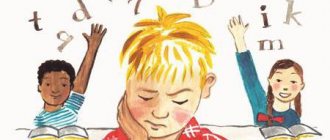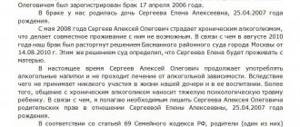Characteristics of a 1st grade student
Alexandra Merkushina has been studying at this educational institution since September 1, 2015. Before school, she attended MDOU kindergarten No.____. The family in which the girl is being raised is complete. Parents attend all parent-teacher meetings, take an active interest in the child’s success, and take an active part in the life of the class and school.
The girl has a high level of cognitive activity, developed educational motivation, broad erudition, the ability to clearly and systematically express her thoughts, has a large amount of information and speaks freely on various topics. The stock of ideas about the surrounding world and speech correspond to the level of development. The sound pronunciation is correct. Thinking is distinguished by a high level of generalization and classification. Cognitive processes (attention, memory) also have a high level of arbitrariness; There is a good concentration of attention, no difficulties in distributing attention, no switching from one type of activity to another, she is very active in class. Enjoys participating in various types of research activities in class. Alexandra easily works at the same pace with the whole class. The girl completes her school assignments quickly, accurately, and correctly. Alexandra is always active in class and outside of class.
Municipal educational institution secondary school in the village
Ivanova Victoria was born on January 25, 1995 in the city of Kyzyl, Republic of Tyva. Lives in Gusevsky district, Mayskoye village, st. Tsentralnaya, 6. Studied at the branch of Municipal Educational Institution Secondary School No. 3 “Secondary School in the village of Mikhailovo” since September 1, 2009. Arrived from Municipal Educational Institution Secondary School No. 3 in Chernyakhovsk, Kaliningrad Region. During my studies I changed 7 educational institutions. In the 7th grade she was left for repeated training. She had annual unsatisfactory grades in algebra, geometry, history of the Fatherland, and a foreign language. He is brought up in a single-parent large family by his mother, Svetlana Igorevna Ivanova. Victoria has two younger sisters. Victoria smokes. Moves quickly from joy to sadness for no apparent reason; there is an inappropriate change in mood. Victoria, probably due to frequent changes of schools, frequent absences from classes, and insufficient home preparation, has large gaps in knowledge in many subjects. Motivation to study is weak. Attention in class is unstable, often forgets notebooks and pens. As a rule, does not show interest in acquiring new knowledge. Slow and has difficulty concentrating in class. Makes many careless mistakes and does not notice them when checking. Not organized. Doesn't know how to distribute his work over time, wastes time. Victoria often does not do her homework, is distracted in class, violates discipline, interferes with other students’ work in class, and hides her diary. Does not respond properly to teachers’ comments or responds with rudeness and abuse. Very often misses classes without good reason. Does not show initiative in social activities. He often refuses to participate in public affairs and tries to avoid any work. Often does not fulfill his self-care responsibilities (school duty, class duty, participation in labor cleanup days) or performs them very carelessly after repeated reminders. By nature, the girl is reserved, stubborn, and prone to lies. Victoria has poor control over her feelings and easily falls into a state of confusion and depression. Has increased emotional excitability, prone to violent emotional manifestations. He almost always acts rashly and does not control himself carefully enough. Often cannot suppress unwanted emotions, and cases of foul language have been observed. Always harsh, uncontrolled both in communication with peers and with elders. In a quarrel, he insults other students, is rude, and uses physical force. Rejects any criticism. Refuses to admit his obvious mistakes and does nothing to correct them. Violates the school charter. Refuses to comply with teachers' demands. Has a negative influence on classmates. Doesn't enjoy authority in class. Although Victoria was a difficult teenager and was registered in the children's room of the police in Chernyakhovsk, her mother, despite repeated invitations, refused to attend school. Communication with Victoria's mother takes place over the phone. Victoria's mother blames the school for everything and can no longer influence her daughter.
13 Apr 2021 polrostov 98
Share this post
- Related Posts
- Characteristics From the District Officer
- From what moment does a new surname count?
- Land Market Analytics
- Debt Accruals for Housing According to Payer Code
Characteristics of the parent: sample
- depending on the structure - complete/incomplete family, specifying why one of the parents is missing and whether there is a connection with him;
- from material security - a family with high/medium/low material income. It is important to note the parent’s occupation and his participation in material well-being;
- from the socio-legal stability of the family - a socially stable/unstable family with prosperous/disadvantaged educational potential (indicate the reasons for these phenomena);
- by type of relationship - harmonious, conflict, unstable.
The family is incomplete. In addition to his father, his grandmother lives with the student. (grandmother's full name), . year of birth, pensioner. Mother. (student’s name, surname) has been deprived of parental rights and is in prison. The family lives in a one-room apartment belonging to the grandmother. Living conditions are unsatisfactory: the apartment requires renovation, the heating is turned off, the child does not have a place to study. The family's financial situation is also unsatisfactory; they live on their grandmother's pension and their father's temporary unemployment benefits. The child often does not have lunch at school and wears clothes that do not match the season.
Family characteristics
- Status: full-time, part-time, with many children or with one child, information about adoption or guardianship of the child.
- Financial security of the family: how stable is the income, what factors does it depend on (payment of alimony, seasonal work, unemployment or disability of family members), does the child have pocket money, how well is he provided with necessary things (food, clothing, school supplies), is he experiencing family financial difficulties, how financial status affects the psychological climate in the family (satisfaction, feelings of inferiority, conflicts).
- Social stability/instability of the family, tendency to addiction (alcohol, drugs, gambling) or crime.
- Distribution of responsibilities and main functions (household, financial, emotional-therapeutic, educational, etc.).
- Who has the formal or actual role in raising a child? It may not necessarily be performed by the same people. For example, parents working abroad are formally the educators of their child, but in fact these functions are performed by another relative (grandmother, grandfather), who is in close proximity to the child.
It should be added that if a specialist is dealing with a child from a disadvantaged family, the characteristics of the family itself should be followed by the characteristics of the student. This is due to the fact that such a child may experience significant difficulties in adapting to an educational institution, which will naturally affect academic performance and relationships in the team. Such a child needs special attention from the teaching staff and, possibly, assistance from related specialists.
Characteristics of a student from a disadvantaged family
——- is trained in the educational system “Planet of Knowledge”. The child loves school, but is often passive during lessons, has an average level of motivation, and takes a long time to switch from one type of work to another. He follows the rules of the student, but sometimes gets distracted by other things (draws in a draft, leafs through a textbook), and is inattentive. Academic performance is satisfactory. Difficulties in mastering material in the Russian language. In mathematics lessons he does not always keep up with the pace of the class; he enjoys working at the blackboard, but does not write neatly in his notebook, without desire. In oral subjects (reading and environment), homework is always completed. Willingly attends clubs and extracurricular activities. ——- participates in school competitions and has repeatedly become a winner.
In the classroom, the child is active, sociable, takes on any assignment, and treats his responsibilities conscientiously. Sometimes conflicts arise with classmates, he complains about the guys, but after clarifying the situation, it turns out that the conflict started through his fault. He can also respond to aggressive behavior with aggression, but does not hold a grudge and quickly forgets about conflicts. There are no conflicts in relations with teachers.
For a student with a low level of knowledge and performance
Nikita Kornilovsky has been studying at the State Institution “KSOSH No. 2” in Kirov since the 1st grade. Throughout his time at school, he showed such qualities as laziness and indifference to the educational process. Does not show due attention to the proposed educational material, is distracted by extraneous activities and ignores teacher comments. He is more interested in communicating with his classmates. Passive behavior in the classroom leads to poor academic results. Doesn't complete homework assignments, but is a master at copying.
Characteristics of a student from a disadvantaged family with bad behavior
Lives in a single-parent family with his mother. She cannot pay due attention to raising the child, since it is difficult to keep track of Andrei’s movements. Mom tries to keep in touch with the school administration and the class teacher.
- aggression towards others, rejection of other people's opinions;
- deliberately demonstrative behavior to attract attention;
- isolation, wariness, reluctance to make contact;
- fear of adults, constant tense anticipation of a blow, insult;
- depressive states, mournful facial expression;
- increased anxiety, apathy;
- lack of concentration, restlessness;
- self-doubt, inadequate self-esteem;
- excessive compliance, servility and ingratiation;
Ilya Kuznetsov has been studying in the 5th grade of secondary school No. 42 in Tomsk since 09/01/2021. Ilya’s studies in basic subjects are assessed as “satisfactory”. The demands of teachers during the educational process are not met by Kuznetsov, the child’s homework is ignored. Ilya's behavior in lessons and during breaks is unsatisfactory. He often argues with teachers and may leave the classroom during a lesson. Distracts other children from their activities. He does not comply with the internal regulations, the class duty officer refuses to do so. On principle, he refuses to bring textbooks and workbooks to class. Does not recognize authorities in the form of teaching staff and adults in general. Shows disrespect and rudeness towards them. Reacts inadequately to comments and criticism, making counter-accusations. His character is very unbalanced and choleric. Reacts sharply to any statement made by classmates about him. Capable of using physical force against children. Has inflated self-esteem, considering himself a highly developed personality. Repeated conversations in the presence of Kuznetsov’s mother did not bring positive results.
More to read —> From what date is the discounted travel on the St. Petersburg train valid for pensioners in St. Petersburg
Characteristics of a dysfunctional family
In practice, adult members of a dysfunctional family are reluctant to agree to interference in their lifestyle. It can be difficult to characterize such citizens. For this work, a group of specialists - social educators and psychologists, employees of commissions on juvenile affairs, guardianship services, teachers and educators is involved.
- when depriving parents of rights in relation to children;
- when parents are limited in maternal or paternal rights;
- when determining the order of communication with the child;
- when deciding on the return of a child to parents from a guardian.
- child data;
- how many years has the organization been attending;
- whether you attended other preschool institutions;
- level of child development (appropriate/inappropriate for age);
- the child’s appearance (whether well-groomed or not);
- how often are omissions allowed?
- who picks up the child from kindergarten;
- whether other relatives or strangers help;
- whether bruises or beatings were noticed on the child;
- whether the parent was intoxicated when picking up the child;
- whether parents exercise control over the child’s educational activities;
- whether the child had a case of head lice or scabies.
Can the school prepare a reference for the mother?
Educational organizations (schools, kindergartens) are part of the system for preventing neglect and homelessness of children. If signs of family trouble appear, teachers must alert the child welfare department or the district control department.
Department of Education of the City of Moscow. Recreation and recreation in an ecologically clean region of Belarus for children aged 10 years. Nikitina Victoria has been studying at this school since before entering school, she did not attend a preschool institution. During her studies she showed a low level of educational achievements in all subjects.
How to write a profile of a dysfunctional family and child
- Lack of supervision of a minor, his homelessness. The child's basic needs for food and clothing are not met, and most of his time is spent outside the home. Behavioral skills are not developed, there is no emotional support from parents.
- Emotional abandonment. Elements of education and care are present in such a family, the child is fed, clothed, has a place to play and relax. However, his mother and father do not show interest in his mental and psychological state. The baby feels unnecessary, uninteresting, a heavy burden that no one cares about. This attitude is typical for situations of unwanted pregnancy.
- The extreme and most severe form is domestic violence - physical or psychological. The mother and (or) father take out aggression on the child due to their own failures. In such cases, the baby’s psyche suffers irreparably; there is a real threat to his life and health.
We recommend reading: I will buy permanent registration in the Moscow region
The family is the place where the foundations of any person’s personality and psychological attitudes are laid. The behavior of the parents is copied by the child unconsciously. In cases where the existing way of life in a family cripples the psyche of a small person or parents do not fulfill their direct responsibilities for supporting children, the question arises of removing the child from such a family or helping to overcome the crisis. In such a situation, a characteristic of a dysfunctional family for guardianship is required; a sample is presented in this article.
What is the characteristic
The experience of interaction of social services with negligent fathers and mothers shows that they rarely and reluctantly cooperate with guardianship authorities and often have a negative attitude towards interference in issues that they consider exclusively their personal matter.
In such situations, writing a character reference for a family is quite problematic, and teachers (primarily the class teacher), social educators, psychologists, representatives of the commission for minors and guardianship authorities may be involved in this work. The characteristics of a dysfunctional family are compiled based on the results of interviews with family members and familiarization with living conditions, which are also described in this document.
Teachers compiling characteristics, before starting to prepare the document, should draw up a plan that includes all the points that should be indicated and the sequence of their presentation:
- General information about each family member - education, profession, place of work or study.
- Housing conditions - living space, condition of the premises, availability of furniture and household items necessary for the child, rooms for recreation and activities.
- Description of the reasons why parents are considered dysfunctional.
- Psychological atmosphere in the family circle, the nature of relationships.
- Characteristics of a family member who focuses on raising and caring for the child.
Approximate characteristics of primary school students
During his studies, _____ showed himself to be a very active, open, sociable child. He easily comes into contact with peers and teachers. Treats adults with respect and listens. Follows all instructions from the teacher. The boy is neat, his school supplies are in good condition, but the work in his notebooks is sloppy due to inattention. He tries to keep not only his things in order, but also school property. The reaction to the teacher’s comments is positive, he tries to correct mistakes, and feels guilty. However, Vlad is easily influenced by his surrounding classmates. He is friends with everyone in the class, but gives greater preference to friendship with __________. They have been friends since kindergarten, as well as “neighborhood housing,” so the boys often return from school together and go to each other’s houses to play on the computer. Vlad's mother tightly controls their friendship.
Physical development and state of health _____ corresponds to age and normal, there are no serious diseases, well developed, rarely gets sick. The mother constantly monitors the child’s school performance and behavior, and also cooperates with the teacher and provides all possible assistance. Every Saturday _______ comes to school to talk with the teacher, and also often calls on urgent issues.
Characteristics for the military registration and enlistment office for a positive student
Igor Shishkin has been studying at the State Institution of the Russian Federation “PSOSH No. 17” in Pskov since the 1st grade. During all years of study at school, he follows the internal rules and does not violate discipline in lessons. He studies mainly for a grade of “4”. Has a mathematical mind.
Intellectually developed, well-read, has a rich vocabulary. Able to organize material in a logical sequence, analyze and draw conclusions.
Constantly improves, uses additional literature when preparing for lessons, expanding his own knowledge beyond the school curriculum.
He is efficient and takes a responsible approach to completing the assigned task. He is distinguished by his ingenuity, is erudite, does not succumb to the influence of others, and is independent.
He has the makings of a leader, is an example for his classmates, and never refuses to help them. Sociable, tactful in communication. Adequate to criticism.
Has a good level of physical fitness. Participant in many school and extra-school sports competitions. There are no bad habits.
Igor lives with his father, mother and older brother. The positive microclimate of the family has a beneficial effect on the boy. Parents are not indifferent to Igor’s fate; they are constantly interested in his successes.
The characteristics are given for presentation to the military registration and enlistment office.
Characteristics of a 1st Grade Student From a Dysfunctional Family for Care from a Teacher
The ability to compile a characterization of a lagging student plays an important role in the educational process, since it is compiled with maximum consideration of the individual and psychological characteristics of the student. It is especially important for a teacher to have the skills to compile a profile of a lagging 1st grade student, allowing teachers to subsequently gain an initial understanding of the child, his family, environment, social status, educational and leisure activities, and his interests.
Characteristics for a 1st grade student are usually compiled for submission to third-party organizations. And like any other external document, it must be drawn up on school letterhead and certified by the signatures of the originator, the head of the institution and the seal. When compiling, the volume is not so important as the completeness of the information provided. In order not to miss anything, it is recommended to use samples and templates. They indicate approximate categories of personality characteristics that require description.
We recommend reading: Regulations on Compensating Benefits for Workers in a Combined Kindergarten
Characteristics of a child to the guardianship authorities: sample
Any class teacher has to face the problem of writing characteristics for students in his class: such dossiers may be necessary to submit to the guardianship authorities, to the police, in order to transfer to another school or institute.
A psychological and pedagogical characterization of a child under guardianship must be provided by the class teacher, head teacher or director of the educational institution. When describing a child’s psychology, you may need the support of a school psychologist, the results of tests and diagnostics conducted among students.
Social and pedagogical characteristics of the student
Family and household relations.
Family structure (one-parent / single-parent, single mother, adopted child, stepfather / stepmother). Family composition at the time of the examination, information about family members, possibly other persons living with the child. Correspondence of place of residence and registration (registration) - in particular, if there is refugee status, etc. Social, professional status, educational level of parents and other persons directly communicating with the child. Ensuring the social and legal protection of the child in the family. Family dynamics (marriages/divorces); form of marriage (legal/civil); death of a family member; birth sequence of children; death of a family member. Pedagogical. parental competence (neglect, parents ignore not only the spiritual world of the child, but also do not fulfill the most basic requirements for caring for him - the child is often sloppily dressed, looks as if he is eating very poorly). Abuse of a child, increased guardianship (constant monitoring of the child’s behavior, excessive protection from imaginary and true dangers, parents’ exaggerated idea of the child’s fragility and illness); contradictory upbringing (each family member makes his own demands on the child). The relationship between parents and the school (parents do not pay attention to the child’s appearance and clothing, parents have little communication with teachers, and are not interested in the life of the school and class). Type of family upbringing (permissive / “Cinderella” / etc.).
Communication skills
. formed. Socio-psychological status in the group (“star/preferred/leader/rejected/isolated”). Features of social contacts: the nature of relationships with classmates (disturbed / conflictual / does not provoke conflicts / smooth / calm, interferes with other children in games, laughs at them, offends weaker ones, exposes himself, clownishes, plays the role of a “clown”, often quarrels with classmates , pesters everyone, is on bad terms with some of them, is unloved by other children, is often made fun of, fights, bites, scratches, uses dangerous objects as a fighting weapon, is withdrawn, isolated from other children, prefers to be alone, to communicate with peers prefer loneliness, a tendency towards leadership or conformity is revealed). Relationships with teachers (even/friendly/calm/conflict/provokes conflict, treats the teacher with respect and maintains the necessary distance in communication with him, practically does not interact with teachers, looks shy, gets lost, is shy, avoids contact with teachers, tries to be inconspicuous, timid, can make a request to the teacher, listens to the teacher’s comments and demands, tries to fulfill them, does not fulfill the requirements, answers impudently, rudely, shows negativism towards the teacher).
Digital library
One of the positive aspects of the crisis is that in this case, school workers, social educators, specialists from various centers, social protection, etc. are involved in the sphere of influence on a dysfunctional family. This fact is in itself reassuring; Connecting new forces exercising control to the situation in which a dysfunctional family finds itself somewhat alleviates the family’s state of loneliness. Families in chronic crisis strive in every possible way to ensure that their situation is under outside control. When they feel threatened by a loss of control, they resort to violence against others and aggravate their antisocial behavior, which provokes increased control over them.
Families in constant crisis are in a special state of suffering. Having gone through countless experiences of loss and trauma, members of such families accumulate too much pain to again expose themselves to the risk of feeling lost and empty. Instead, they prefer to be in a state of rage and rejection of the world around them. A state of crisis is the norm for them. Instead of becoming vulnerable and affected by change, at-risk families learn their own defenses when faced with difficulties. The paradox is that excitement and rage bring them a certain comfort as proof that nothing can be done and therefore their state is natural. This state of at-risk families is maintained through various means: alcohol, scandals, immoral, defiant behavior, hooliganism, etc.
Download a profile for a 1st grade student from a disadvantaged family
. Presentation “Ethnographic characteristics of the Kazakh ethnic group. Characteristics of Dmitry Borisovich Fedoseev, born 06/03/1993, 1st grade student Download for the pedagogy lesson Characteristics of a 1st grade student. A 1st grade student from a dysfunctional family with parents. Everyone has had to deal with such a concept as characteristic. Characteristics of a 1st grade student. Characteristics of a difficult student from a disadvantaged family. School, class. for a 7th grade student of the branch of Municipal Educational Institution Secondary School No. 3 in Gusev. Pedagogical characteristics for a student located. Characteristics of a student from a disadvantaged family. Characteristics of a difficult student from a disadvantaged family. The characteristics indicate the composition of the family, the financial situation of the family. Examples of typical and atypical characteristics of students. Characteristics of a 1st grade student.
We recommend reading: Private house tax 2021 rate
Last name, first name, patronymic, year of birth - father Characteristics of a 1st grade student. Class teacher: (.) Characteristics for a student of grade 1 “b”. All matches are random. General information about the child and his family Full name Characteristic. The family's material and living conditions are satisfactory. Ugryumova. Download samples of writing characteristics for a primary school student for presentation upon request. Characteristic. Classroom management: Characteristics of a student. Not enough time is devoted to issues of child upbringing and development in the family.
Are you here
The class teacher very often has to fill out characteristics for students. This document is a description of the psychological, social and personal qualities of the student. It is compiled both for the needs of the school itself and for external users. It can also be drawn up by the head teacher, director or psychologist of the educational institution.
It is best to use a variation of this characteristic - a graphic psychological-pedagogical map. It represents a scale, at the beginning and at the end of which there are characteristics of the student that are opposite in value. For example, “Study with interest” and “Not interested in studying.” The map is divided into blocks. For example, “Study”, “Behaviour”, “Communication in the family”, “Communication at school”, “Social activity”, “Personal qualities”. This document also allows you to evaluate the degree of development of the child’s qualities using a scale.
LAWSUIT IN COURT ->
The son’s deviant behavior is associated with his pedagogical neglect and the lack of a socially positive social circle. The boy turned out to be an “outcast” among his peers; he does not attend sports or other leisure institutions.
Tatyana Ivanovna’s participation in the work of self-help groups “Alcoholics Anonymous” became important. This was not only a huge step in recovery, but also helped her enter a positive social environment, a new circle of communication, which became especially important for her.
Material (1st grade) on the topic: Characteristics of a 1st grade student
Physically the child is developed normally. During lessons he is impatient, restless, fidgets in his chair, and gets tired quickly. During lessons he is involved in extraneous activities. Often forgets to prepare for class. Cannot plan his activities. Has difficulty navigating writing and math workbooks. Difficulty mastering program material, not keeping up with the overall pace of the class, and experiencing learning difficulties. Cannot concentrate on a task; requires instruction when performing tasks and control over their implementation. The activity is unsustainable. In the situation of carrying out testing work, inhibition is noted (slowness, does not complete some tasks). There is a lack of attention. The pace of work is slow.
Orients himself in the surrounding world. Sometimes he is active in lessons about the world around him, but as a rule he shouts out answers from his seat. The boy knows the month of his birth, but does not remember the date. Can name his and his mother's last name, first name, and patronymic name. Can name the days of the week, seasons of the year with a hint. Not everyone knows the names of the months; they cannot name them in order. Confused in general (categorical) concepts such as “animals”, “insects”. Instead of the words “vegetables” and “fruits” I used the definition “food”. In art and technology lessons, he quickly loses interest in assignments and is incapable of volitional efforts. Needs additional explanation from the teacher.
STATEMENT OF CLAIM ->
- high, shows interest in acquiring knowledge, completes tasks independently, transfers the shown method of action to similar tasks, moves from a simpler way of performing tasks to a more complex one, notices and corrects mistakes made without outside help
1. Preventive work on the basis of educational institutions: kindergartens, schools, vocational technical schools, technical schools. Conducting lectures, discussions, designing thematic stands. Meeting of children with psychologists, psychoneurologists, neurologists, narcologists, pediatric gynecologists, social teachers, juvenile affairs inspectors, and local police inspectors. Prevention of deviant behavior, promotion of a healthy lifestyle. Impact through reference groups, media.
Example of typical characteristics of students
A student's characteristics are an official document drawn up by the student's class teacher, characterizing the child's basic skills and abilities, his personal qualities, skills and attitude to learning. In addition, the reference must include information about the parents or guardians of the minor student.
Depending on the student’s abilities, the characteristics can be written for both a successful and an average student. The document is drawn up in a free style, however, when writing it, certain requirements must be met, namely, compliance with the approximate plan.
26 Jan 2021 etolaw 782
Share this post
- Related Posts
- Can a Common-law Husband Take a Mortgage Apartment for Debts?
- Does studying at a Military School Institute count towards my work experience if I worked before?
- Orphan Amount for the Purchase of Housing
- What is the Standard for Water Without a Meter in Ivanovo in 2021






